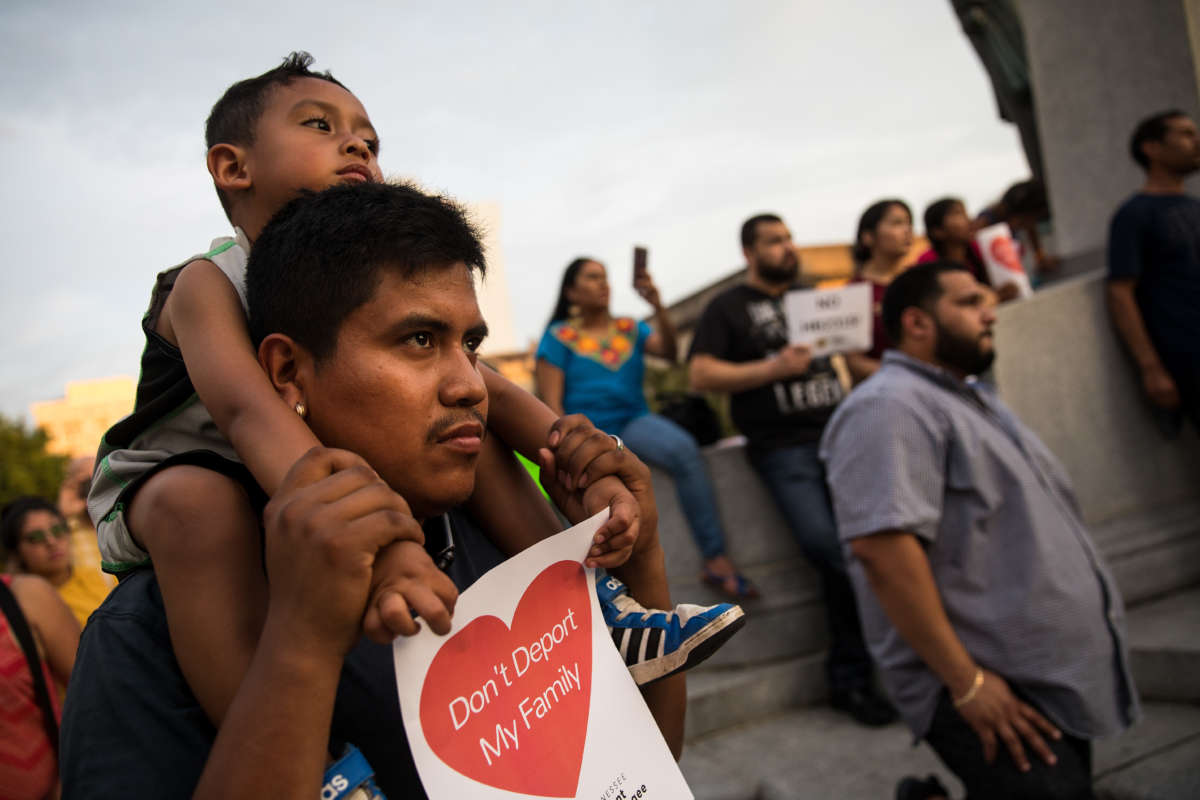The 6th Circuit Federal Appeals Court ruled on July 5 that the Biden administration could enforce guidelines to pause deportations unless individuals had committed acts of terrorism, espionage, or “egregious threats to public safety” in a lawsuit brought on by Arizona, Ohio, and Montana. But the next day, the conservative sister court in the 5th Circuit issued a ruling in a similar suit brought on by Texas and Louisiana, blocking the Biden administration from enforcing the new guidelines.
The conflicting rulings will now send the Department of Homeland Security guidance to the Supreme Court for an ultimate decision, leaving the fate of deportation determinations in the hands of a notoriously conservative court that handed down two decisions last month that limited immigrant rights. While the Court unexpectedly decided to allow Biden to end the Trump-era Remain in Mexico policy, it is still unclear what the Supreme Court will decide regarding deportations. In the interim, the fate of immigrants attempting to migrate to the country will be in the hands of local Immigration and Customs Enforcement officers’ own determinations. Associate Policy Director for the National Immigrant Justice Center Nayna Gupta said the conflicting circuit court rulings create confusion, which can be especially harmful for immigrants who find themselves in this precarious limbo.
“It goes without saying that this is not a friendly court for immigrant communities,” Gupta said. “We’ve seen a couple of really problematic decisions. We also recently saw a more positive decision regarding the Remain in Mexico program. So, I can’t make predictions.”
Since deportation priorities have been the subject of back-and-forth litigation, there has not been any clear direction for ICE officers on the ground on whom they should be arresting, detaining, or pursuing deportation proceedings against. According to Gupta, what this means in practice is that there will be a wide variety of how decisions are being made.
“It’s not entirely clear, to be honest, to us as advocates what ICE officers might be following right now,” Gupta said. “What fills in is not really clear, it doesn’t mean they automatically revert to an old set of priorities. There’s really just … no clear answer.
While former President Donald Trump’s policy was to deport immigrants regardless of criminal history, Gupta said ICE officers should not immediately revert back to implementing a previous guideline. Since the rulings were handed down fairly recently, Gupta said it is possible there will not be immediate changes as the Department of Homeland Security determines the next best steps.
“We don’t necessarily have a clear sense of what’s going to happen on the ground,” Gupta said. “But we’re certainly worried and concerned that this lack of clarity could be really harmful for our communities. It would mean individual ICE officers having even more discretion than ever before in deciding whom to pursue immigration laws against.”
At the heart of the legal battle is a question about how much discretion and authority the Biden administration has under current immigration laws to set priorities for how it enforces U.S. civil immigration laws and whether states have the standing to sue against those priorities. In the current political landscape where conservative courts are siding with states’ rights, this could be another push in that direction.
The Department of Homeland Security and Secretary Alejandro Mayorkas have not released a statement or clarification regarding the rulings, and they have not returned Prism’s request for a statement. According to Gupta, in communities where there is a heavier anti-immigrant sentiment amongst local law enforcement agencies, those communities could now be at higher risk.
“It’s a mess, really. There’s confusion,” Gupta said. “Communities could be at higher risk now because ICE officers have been left to their own devices to make decisions.”
Gupta hopes to see DHS release a statement or guidance as to what happens next on the enforcement front. In addition, she hopes that enforcement priorities will be put on hold so that advocates can prepare their communities for what to expect.
“We don’t want to see enforcement actions against our communities,” Gupta said. “If you’re unable to enforce civil immigration laws in a clear, transparent, consistent manner, there should be a pause on aggressively enforcing them. Rather than an uptick in enforcement actions, there should be a slowing of them because of this confusion.”
Prism is an independent and nonprofit newsroom led by journalists of color. We report from the ground up and at the intersections of injustice.
Our most important fundraising appeal of the year
December is the most critical time of year for Truthout, because our nonprofit news is funded almost entirely by individual donations from readers like you. So before you navigate away, we ask that you take just a second to support Truthout with a tax-deductible donation.
This year is a little different. We are up against a far-reaching, wide-scale attack on press freedom coming from the Trump administration. 2025 was a year of frightening censorship, news industry corporate consolidation, and worsening financial conditions for progressive nonprofits across the board.
We can only resist Trump’s agenda by cultivating a strong base of support. The right-wing mediasphere is funded comfortably by billionaire owners and venture capitalist philanthropists. At Truthout, we have you.
We’ve set an ambitious target for our year-end campaign — a goal of $240,000 to keep up our fight against authoritarianism in 2026. Please take a meaningful action in this fight: make a one-time or monthly donation to Truthout before December 31. If you have the means, please dig deep.
